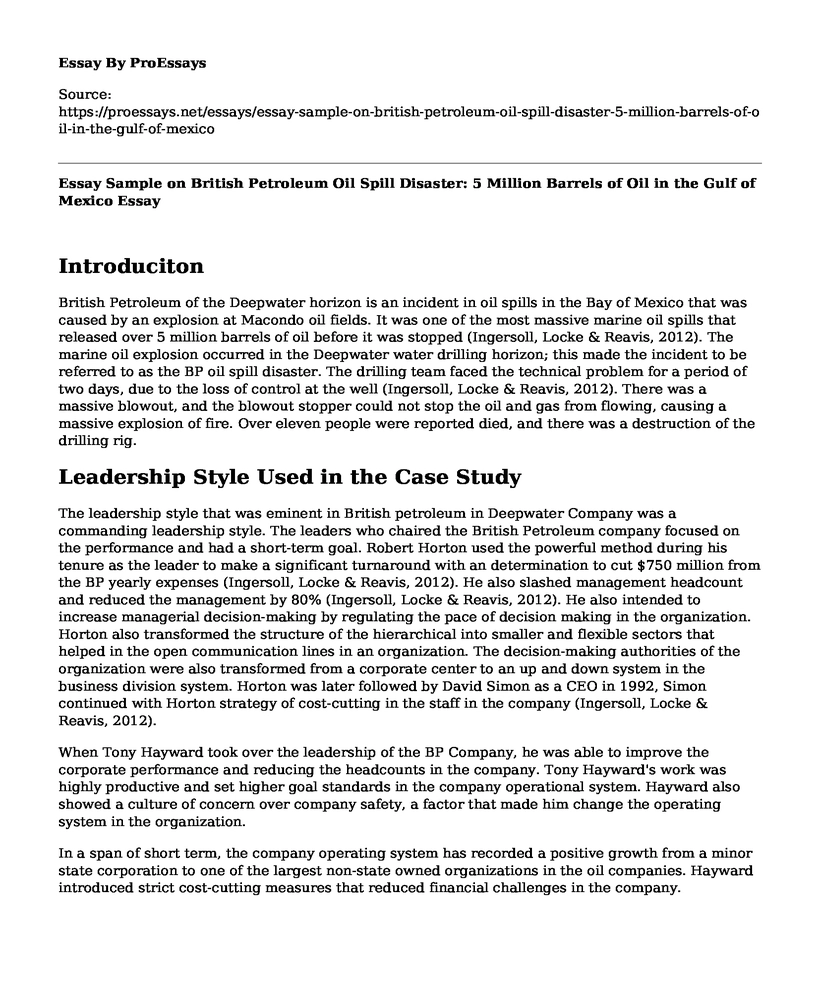Introduciton
British Petroleum of the Deepwater horizon is an incident in oil spills in the Bay of Mexico that was caused by an explosion at Macondo oil fields. It was one of the most massive marine oil spills that released over 5 million barrels of oil before it was stopped (Ingersoll, Locke & Reavis, 2012). The marine oil explosion occurred in the Deepwater water drilling horizon; this made the incident to be referred to as the BP oil spill disaster. The drilling team faced the technical problem for a period of two days, due to the loss of control at the well (Ingersoll, Locke & Reavis, 2012). There was a massive blowout, and the blowout stopper could not stop the oil and gas from flowing, causing a massive explosion of fire. Over eleven people were reported died, and there was a destruction of the drilling rig.
Leadership Style Used in the Case Study
The leadership style that was eminent in British petroleum in Deepwater Company was a commanding leadership style. The leaders who chaired the British Petroleum company focused on the performance and had a short-term goal. Robert Horton used the powerful method during his tenure as the leader to make a significant turnaround with an determination to cut $750 million from the BP yearly expenses (Ingersoll, Locke & Reavis, 2012). He also slashed management headcount and reduced the management by 80% (Ingersoll, Locke & Reavis, 2012). He also intended to increase managerial decision-making by regulating the pace of decision making in the organization. Horton also transformed the structure of the hierarchical into smaller and flexible sectors that helped in the open communication lines in an organization. The decision-making authorities of the organization were also transformed from a corporate center to an up and down system in the business division system. Horton was later followed by David Simon as a CEO in 1992, Simon continued with Horton strategy of cost-cutting in the staff in the company (Ingersoll, Locke & Reavis, 2012).
When Tony Hayward took over the leadership of the BP Company, he was able to improve the corporate performance and reducing the headcounts in the company. Tony Hayward's work was highly productive and set higher goal standards in the company operational system. Hayward also showed a culture of concern over company safety, a factor that made him change the operating system in the organization.
In a span of short term, the company operating system has recorded a positive growth from a minor state corporation to one of the largest non-state owned organizations in the oil companies. Hayward introduced strict cost-cutting measures that reduced financial challenges in the company.
Recommendation
The British Petroleum company should deploy modern equipment in renewing the energies. The company should replace the new alarms with the modern ones in the renewable energy system. As the manager of the oil company, I will ensure that all the personnel that operates the oil department have the required expertise and experience in the department (Latimer, 2004). Safety measures should be put in place in case of any accidents on the renewables energies
The Five Stages of Organizational Change
As a manager of the British Petroleum Company, I will ensure that the planning of the firm resources is adequately addressed. During preparation, I will ensure that I acquire relevant information, create ideas, strategy formulation of the plan. Secondly, I will explain the policy to the staff by convincing the employees on the program (Lester, Parnell & Carraher, 2003). All the sectors will be empowered and assisted in the organization. In the launching stage, I will implement steps, meet the organizational goal, and assessing the progress. Catalyzing phase, I will inspire, energize, and assist the employees in the corporate sector. Lastly, I will maintain overseeing the development, guide the resource and support the
References
Ingersoll, C., Locke, R. M., & Reavis, C. (2012). BP and the Deepwater Horizon Disaster of 2010. MIT Sloan School of Management, Case Study.Retrieved from http://www.academia.edu/download/36715434/Deepwater_Horizon.pdf
Latimer, J. (2004). Commanding materials:(re) legitimating authority in the context of multi-disciplinary work. Sociology, 38(4), 757-775.Retrieved from https://journals.sagepub.com/doi/abs/10.1177/0038038504045863
Lester, D. L., Parnell, J. A., & Carraher, S. (2003). Organizational life cycle: A five-stage empirical scale. The international journal of organizational analysis, 11(4), 339-354.Retrieved from https://www.emeraldinsight.com/doi/abs/10.1108/eb028979
Cite this page
Essay Sample on British Petroleum Oil Spill Disaster: 5 Million Barrels of Oil in the Gulf of Mexico. (2023, Feb 27). Retrieved from https://proessays.net/essays/essay-sample-on-british-petroleum-oil-spill-disaster-5-million-barrels-of-oil-in-the-gulf-of-mexico
If you are the original author of this essay and no longer wish to have it published on the ProEssays website, please click below to request its removal:
- Annotated Bibliography on Building Information Model
- Human Rights and Ethics in the Oil and Gas Industry Paper Example
- Peak Oil and Challenges Facing Coal Production and Use in USA Essay
- Local Content in Petroleum Producing Economies Paper Example
- Essay Sample on Usage of Concrete
- Essay Example on Descending Motor Pathways: Rubro, Corticospinal & Reticulospinal
- Alternative Fuels: Growing Demand, New Solutions - Essay Sample







